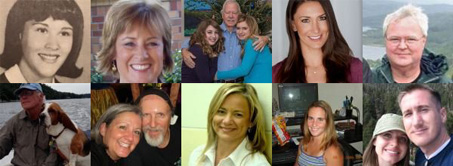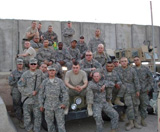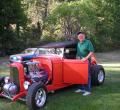Corona High School Alumni
Corona, California (CA)
Alumni Stories
Jeffrey Cleveland
Class of 1998
On Saturday, September 13, 2008, I swam from Shakespeare Beach in Dover to the Cap Griz Nez, France, landing on the rocks just after sunset (http://en.wikipedia.org/wiki/Image:Cape_Gris_Nez,_France.JPG). It took just over 10 hours to complete. I think we were the fifth fastest solo swim of the 2008 season so far!
But this swim isn't about time. It is almost entirely a mental battle. The setting for this battle just happens to be one of the most challenging stretches of water to swim across on earth. The swim was by far the most difficult (and, by virtue of that, probably the greatest) accomplishment of my lifetime. A major triumph. I suppose there's a reason they call it the Mt. Everest of Open Water swims.
A few background answers on the swim based on the frequently asked questions:
Distance: 20 nautical miles (23.2 land miles) straight across, but we swam more due to currents
Water Temp: 62 degrees
Air Temp: mid to high 50s.
Wetsuit? No. Endurance jammer
Sharks?: No -- water is too dirty and ships are too many.
Jelly Fish?: Yes
Currents?: swimming the Channel is like swimming across a giant river. Except the river is the busiest shipping route in the world, the weather changes dramatically and the currents change direction every 6 hours, pushing you north then pushing you south.
Ships?: Huge container ships, cruise ships and ferries all crossed within just 25-50 yards of us during the swim. The channel is the busiest shipping lane in the world.
Can you rest during the swim?: You can stop all you want, but you can't touch the boat or anything else. I stopped for no more than 20-30 seconds at any point during the swim. Every second you stop your body loses heat.
Feeding: Liquid mix of carbs, protein and electrolytes every 20 minutes after the first hour. No solid foods. Some have questioned the logic behind this approach, but all I can say is: you try eating solid food in cold, salty, choppy water while exhausted in the middle of the ocean and let me know how that goes.
Weather: We waited around in the town of Dover through 10 days of bad weather (rain, wind, cold) and poor swim conditions for the opportunity to go, and it finally presented itself, although the water and air were much colder than is typical for this time of year. One other swimmer staying in our guest house succumbed to the cold earlier in the week and was pulled out of the water. Another swimmer failed after reaching the shipping lanes and finding out about "Channel chop" and seasickness.
How Much Training Did You Do? This swim was really 2 or 3 years in the making. Over that time, I completed 25+ ocean races and 50+ ocean training swims. By the time summer 2008 rolled around, I was swimming 20-30 hours per week, peaking at over 100,000 yards or approximately 50 miles per week in combined pool and ocean time. A key ingredient of success on this swim came from experience in tricky ocean swimming situations: huge swells crashing over our escort boat in the 2006 Maui Channel Swim, 53 degree water in the 2008 Golden Gate Bridge to San Francisco Bay Bridge 10k swim, 59 degree water in a 6-hour San Francisco Bay training swim, encountering seals and jelly fish underneath the Golden Gate Bridge, swimming in the open ocean off of Newport and Santa Barbara, etc. Only experience helps you to overcome unexpected challenges.
This proved to be the key to survival in the English Channel. That's because, despite all of this preparation, after four hours of great swimming, my body rejected every fuel we attempted to consume. The second half of the swim was characterized by . . . vomiting. But that just made the challenge even greater. I powered to the finish on water, pure mental determination and previously stored energy. This means I grew colder as the air temperature dropped along with the sun.
At one point in the swim--feeling the effects of the cold, the fatigue, nausea--I ran through in my head a lifetime of swimming moments, feeling that they all really culminated in those few seconds just a few miles off the coast of France. One in particular stood out. When I was a young swimmer, my favorite days were when it rained during workouts (we swam in an outdoor pool in California). Many of the other kids would get out. I would float right on the surface of the water for a few moments and watch the rain drops splatter. I'd imagine a stretch of open, ocean water. Then I'd swim as hard as I could, refusing to get out until the workout was finished, relishing the challenge.
I think that's what the Channel is all about: refusing--under any circumstance--to quit.
Thanks to all for your support and interest in this adventure.
Special thanks to my brother, Trevor. Without his help, support and guidance during the swim and training, I would not have completed this swim. He also waited around in Dover for 10 days and trained with me (even on several days in the pouring rain) off the coast of England to get ready for the swim. If I may offer one other anecdote: early in a 6-hour training swim in San Francisco Bay, Trevor jumped out of the escort boat underneath the Golden Gate Bridge and into the 57 degree water of the Bay to climb into a kayak. He kayaked over to where I was swimming and -- in the short, safe-for-TV version -- told me to get my act together or I would not finish the swim. I finished. That was a real turning point for the 2008 training season because it drove home the point that much can be overcome with the proper mindset. This victory in the Channel is as much his as it is mine, except for the part where I climbed up on to one of the rocks on the French coast against the advice of our boat captain. That was all me.
Special thanks also to Adrienne for her patience, support, one-of-a-kind sense of humor and those beautiful blue eyes, throughout what has been a multi-year process--but especially in 2008 while I spent 20-30 hours per week in the pool or the ocean.
Special thanks also goes to Payden & Rygel -- without support from the firm and the many enthusiastic people who took an interest in the swim, it probably wouldn't have been possible. Nor would the triumph be as sweet without the many great people to share in the triumph. I know it won't be the last.
Swimming the English Channel makes for a great story so I plan to tell it in further detail. I am writing a more involved account of the swim to send out in the days ahead with more pictures. There's even a video -- where you see me maintaining 60 arm strokes per minute for 10 agonizing hours, colored by Trevor's insightful commentary -- that I may circulate.
One final note to my mother who tossed me into the YMCA pool at six months old and made me a swimmer: we will next conquer the Catalina Channel in the summer of 2009! And this time we aren't doing it to finish. We are doing it for speed.
All the best,
Jeffrey
--
"Pain is temporary, quitting lasts forever." -- Lance Armstrong
But this swim isn't about time. It is almost entirely a mental battle. The setting for this battle just happens to be one of the most challenging stretches of water to swim across on earth. The swim was by far the most difficult (and, by virtue of that, probably the greatest) accomplishment of my lifetime. A major triumph. I suppose there's a reason they call it the Mt. Everest of Open Water swims.
A few background answers on the swim based on the frequently asked questions:
Distance: 20 nautical miles (23.2 land miles) straight across, but we swam more due to currents
Water Temp: 62 degrees
Air Temp: mid to high 50s.
Wetsuit? No. Endurance jammer
Sharks?: No -- water is too dirty and ships are too many.
Jelly Fish?: Yes
Currents?: swimming the Channel is like swimming across a giant river. Except the river is the busiest shipping route in the world, the weather changes dramatically and the currents change direction every 6 hours, pushing you north then pushing you south.
Ships?: Huge container ships, cruise ships and ferries all crossed within just 25-50 yards of us during the swim. The channel is the busiest shipping lane in the world.
Can you rest during the swim?: You can stop all you want, but you can't touch the boat or anything else. I stopped for no more than 20-30 seconds at any point during the swim. Every second you stop your body loses heat.
Feeding: Liquid mix of carbs, protein and electrolytes every 20 minutes after the first hour. No solid foods. Some have questioned the logic behind this approach, but all I can say is: you try eating solid food in cold, salty, choppy water while exhausted in the middle of the ocean and let me know how that goes.
Weather: We waited around in the town of Dover through 10 days of bad weather (rain, wind, cold) and poor swim conditions for the opportunity to go, and it finally presented itself, although the water and air were much colder than is typical for this time of year. One other swimmer staying in our guest house succumbed to the cold earlier in the week and was pulled out of the water. Another swimmer failed after reaching the shipping lanes and finding out about "Channel chop" and seasickness.
How Much Training Did You Do? This swim was really 2 or 3 years in the making. Over that time, I completed 25+ ocean races and 50+ ocean training swims. By the time summer 2008 rolled around, I was swimming 20-30 hours per week, peaking at over 100,000 yards or approximately 50 miles per week in combined pool and ocean time. A key ingredient of success on this swim came from experience in tricky ocean swimming situations: huge swells crashing over our escort boat in the 2006 Maui Channel Swim, 53 degree water in the 2008 Golden Gate Bridge to San Francisco Bay Bridge 10k swim, 59 degree water in a 6-hour San Francisco Bay training swim, encountering seals and jelly fish underneath the Golden Gate Bridge, swimming in the open ocean off of Newport and Santa Barbara, etc. Only experience helps you to overcome unexpected challenges.
This proved to be the key to survival in the English Channel. That's because, despite all of this preparation, after four hours of great swimming, my body rejected every fuel we attempted to consume. The second half of the swim was characterized by . . . vomiting. But that just made the challenge even greater. I powered to the finish on water, pure mental determination and previously stored energy. This means I grew colder as the air temperature dropped along with the sun.
At one point in the swim--feeling the effects of the cold, the fatigue, nausea--I ran through in my head a lifetime of swimming moments, feeling that they all really culminated in those few seconds just a few miles off the coast of France. One in particular stood out. When I was a young swimmer, my favorite days were when it rained during workouts (we swam in an outdoor pool in California). Many of the other kids would get out. I would float right on the surface of the water for a few moments and watch the rain drops splatter. I'd imagine a stretch of open, ocean water. Then I'd swim as hard as I could, refusing to get out until the workout was finished, relishing the challenge.
I think that's what the Channel is all about: refusing--under any circumstance--to quit.
Thanks to all for your support and interest in this adventure.
Special thanks to my brother, Trevor. Without his help, support and guidance during the swim and training, I would not have completed this swim. He also waited around in Dover for 10 days and trained with me (even on several days in the pouring rain) off the coast of England to get ready for the swim. If I may offer one other anecdote: early in a 6-hour training swim in San Francisco Bay, Trevor jumped out of the escort boat underneath the Golden Gate Bridge and into the 57 degree water of the Bay to climb into a kayak. He kayaked over to where I was swimming and -- in the short, safe-for-TV version -- told me to get my act together or I would not finish the swim. I finished. That was a real turning point for the 2008 training season because it drove home the point that much can be overcome with the proper mindset. This victory in the Channel is as much his as it is mine, except for the part where I climbed up on to one of the rocks on the French coast against the advice of our boat captain. That was all me.
Special thanks also to Adrienne for her patience, support, one-of-a-kind sense of humor and those beautiful blue eyes, throughout what has been a multi-year process--but especially in 2008 while I spent 20-30 hours per week in the pool or the ocean.
Special thanks also goes to Payden & Rygel -- without support from the firm and the many enthusiastic people who took an interest in the swim, it probably wouldn't have been possible. Nor would the triumph be as sweet without the many great people to share in the triumph. I know it won't be the last.
Swimming the English Channel makes for a great story so I plan to tell it in further detail. I am writing a more involved account of the swim to send out in the days ahead with more pictures. There's even a video -- where you see me maintaining 60 arm strokes per minute for 10 agonizing hours, colored by Trevor's insightful commentary -- that I may circulate.
One final note to my mother who tossed me into the YMCA pool at six months old and made me a swimmer: we will next conquer the Catalina Channel in the summer of 2009! And this time we aren't doing it to finish. We are doing it for speed.
All the best,
Jeffrey
--
"Pain is temporary, quitting lasts forever." -- Lance Armstrong

Recent Members
| Christina Gutierrez | 1992 |
| Ericka Zamora Ericka Zamora | 2023 |
| Judith Green | 1961 |
| Julie Garnier | 1980 |
| Mike Frey Mike Frey | 1999 |
| Paul Wadenius | 1970 |
| Richard Pinkerton | 1963 |
| Wilhemeta Burrow | 1953 |
Military Alumni
Honoring Our Heroes
This area is dedicated to our alumni that have served or are serving in our armed forces!
Lost Class Rings
Have you lost your Corona High School class ring? Have you found someone's class ring? Visit our Panthers lost class ring page to search for your class ring or post information about a found ring.
Do you have a fun holiday story or a great family tradition? Share them with our fellow Corona High School alumni! Submit your own stories, achievements and photos in our Alumni Stories section. Read other classmate’s stories and see what they have been up to over the years.
Happy Holidays!
Happy Holidays!

